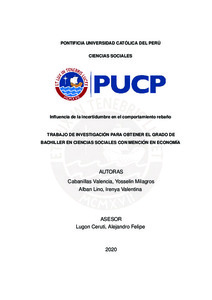| dc.contributor.advisor | Lugón Ceruti, Alejandro Felipe | |
| dc.contributor.author | Cabanillas Valencia, Yosselin Milagros | |
| dc.contributor.author | Alban Lino, Irenya Valentina | |
| dc.date.accessioned | 2021-04-16T17:02:02Z | |
| dc.date.available | 2021-04-16T17:02:02Z | |
| dc.date.created | 2020 | |
| dc.date.issued | 2021-04-16 | |
| dc.identifier.uri | http://hdl.handle.net/20.500.12404/18812 | |
| dc.description.abstract | El desarrollo de la economía del comportamiento ha permitido el estudio de
diversos fenómenos de comportamiento que afectan a la economía. Es así que
en la vida diaria y en los diversas situaciones a las que se enfrentan las personas
se observa casos de comportamientos inusuales. Tal como sucedió al inicio del
brote de la pandemia del Coronavirus, en el se observó compras masivas de
ciertos productos y se generó desequilibrios en el mercado. Esta situacióon, nos
motivó a investigar la naturaleza de este fenómeno: efecto o comportamiento de
rebaño..
Es así que la relevancia de esta investigacióon recae en que al conocer los
factores que aumentan la probabilidad de que se de este comportamiento puede
resultar útil para prevenir su aparición; y a la vez, nos ayudará a evitar tales
desequilibrios que exacerben vicisitudes económicas.
El presente estudio busca analizar la relación entre incertidumbre y comportamiento
de rebaño. La hipótesis que esta investigación propone es que a
mayor grado de incertidumbre hay mayor probabilidad de que ocurra un comportamiento
tipo rebaño. La comprobación de la hipótesis se realizará mediante un
experimento económico de laboratorio con estudiantes universitarios. Nuestro diseño experimental se sustenta principalmente en el modelo de Banerjee (1992)
sobre comportamiento rebaño y en la metodología sobre cascadas de información desarrollada en Anderson & Holt (1997), la cual es clave para la observación
del comportamiento rebaño. | es_ES |
| dc.description.abstract | The development of behavioral economics has allowed the study of various behavioral
phenomena that refer to economics. Thus, in daily life and in the various
situations that people face, cases of unusual behaviors are observed. As happened
at the beginning of the outbreak of the Coronavirus pandemic, it shows
massive purchases of certain products and imbalances were generated in the
market. This situation motivated us to investigate the nature of this phenomenon:
herd effect or behavior.
Thus, the relevance of this research lies in the fact that knowing the factors
that obtain the probability that this behavior occurs can be useful to prevent
its appearance; and at the same time, they help us avoid such imbalances that
exacerbate economic vicissitudes.
The present study seeks to analyze the relationship between uncertainty
and herd behavior. The hypothesis that this research proposes is that a greater
degree of uncertainty is a greater probability of herd-like behavior occurring. Testing
of the hypothesis will be carried out through an economic laboratory experiment
with university students. Our experimental design is mainly based on the
Banerjee (1992) model on herd behavior and on the methodology on information
cascades developed in Anderson & Holt (1997), which is key for the observation
of herd behavior. | es_ES |
| dc.language.iso | spa | es_ES |
| dc.publisher | Pontificia Universidad Católica del Perú | es_ES |
| dc.rights | info:eu-repo/semantics/openAccess | es_ES |
| dc.rights.uri | http://creativecommons.org/licenses/by-nc-sa/2.5/pe/ | * |
| dc.subject | Economía--Aspectos psicológicos | es_ES |
| dc.subject | Comportamiento del consumidor | es_ES |
| dc.subject | Comportamiento económico | es_ES |
| dc.title | Influencia de la incertidumbre en el comportamiento rebaño | es_ES |
| dc.type | info:eu-repo/semantics/bachelorThesis | es_ES |
| thesis.degree.name | Bachiller en Ciencias Sociales con mención en Economía | es_ES |
| thesis.degree.level | Bachillerato | es_ES |
| thesis.degree.grantor | Pontificia Universidad Católica del Perú. Facultad de Ciencias Sociales | es_ES |
| thesis.degree.discipline | Ciencias Sociales con mención en Economía | es_ES |
| renati.advisor.dni | 10004980 | |
| renati.advisor.orcid | https://orcid.org/0000-0001-7956-5634 | es_ES |
| renati.author.dni | 71466598 | |
| renati.author.dni | 71271307 | |
| renati.discipline | 311016 | es_ES |
| renati.juror | - | es_ES |
| renati.level | https://purl.org/pe-repo/renati/level#bachiller | es_ES |
| renati.type | https://purl.org/pe-repo/renati/type#trabajoDeInvestigacion | es_ES |
| dc.publisher.country | PE | es_ES |
| dc.subject.ocde | http://purl.org/pe-repo/ocde/ford#5.02.01 | es_ES |






